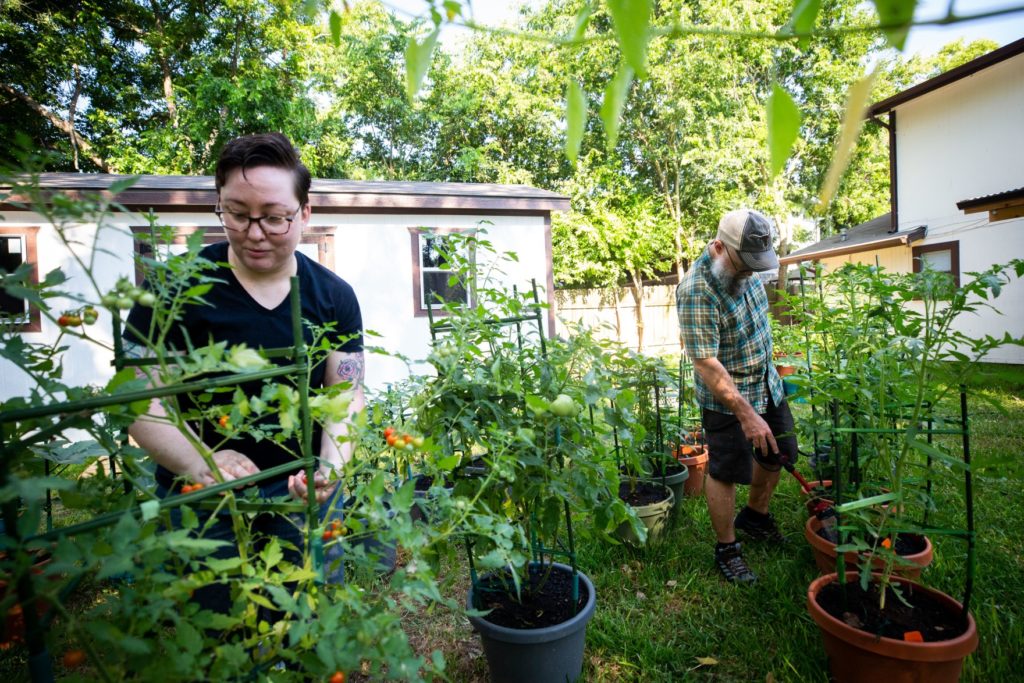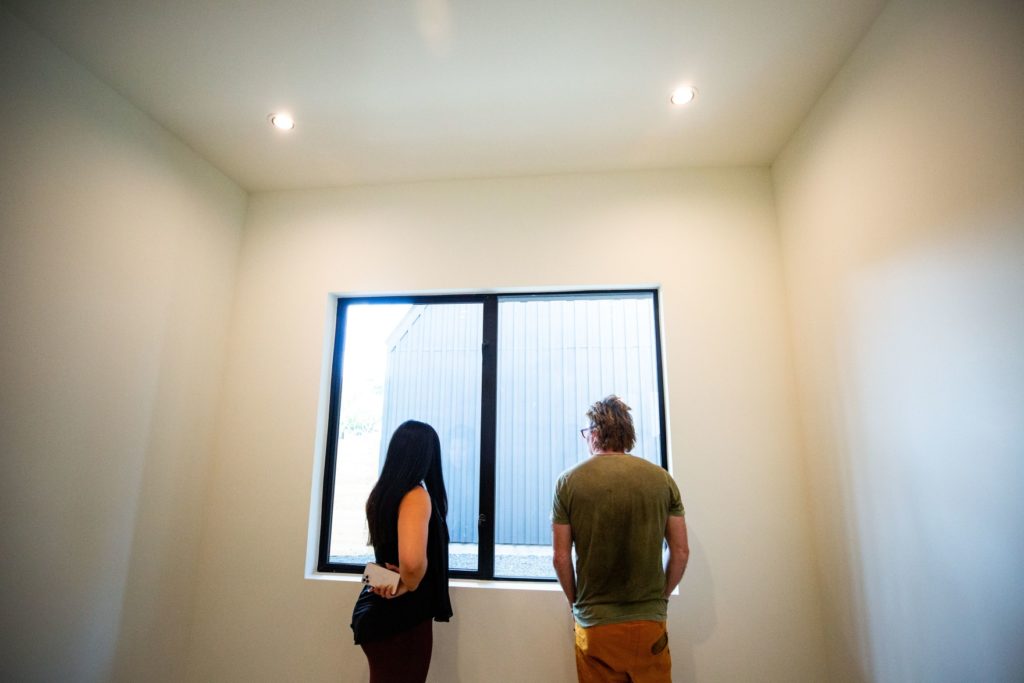Photo by Gabriel C. Pérez/KUT
Home prices in Austin rose $100,000 in six months. When will the surge end?
Wednesday, June 23, 2021 by
Audrey McGlinchy, KUT When Amanda Traphagan was selling her Austin home in April, she and her husband joked that only a wealthy celebrity would be able to offer a significant amount over what they were asking.
“We were making jokes about Elon Musk showing up in the skies,” Traphagan said. She imagined the CEO of SpaceX slinking into an open house, disguised.
“Oh, Kreelon Husk is here to buy the house,” she and her husband, Stephen Gray, joked.
But then the Elon-in-the-sky bid they’d bantered about materialized. A buyer offered $615,000 in cash for their North Austin home; the couple was asking $450,000. It was one of 25 offers they got in three days.

Gabriel C. Pérez. Amanda Traphagan and Stephen Gray tend to the garden at their new home in Lockhart.
“It almost felt like we had listed the thing on eBay,” Gray said. “Everything just happened that fast.”
Despite a pandemic that kept thousands out of work, Austin’s housing market showed no signs of slowing last summer. And over the past year, the market has only intensified. According to numbers reported by the Austin Board of Realtors, there has been a $100,000 jump in the median home sales price in Austin in just six months.
But while experts agree the rapid price gains we’re seeing can’t last, they hesitate to say when the market will slow.
“I do think the level of price growth is unsustainable,” said Ali Wolf, chief economist with housing market research company Zonda. “But it still is a question of, well, does that mean it can still run up for two years or is it six months? And frankly no one can tell you that answer.”
Maybe a Year From Now?
Jim Gaines, an economist with the Real Estate Center at Texas A&M University, is more willing to put an expiration date on Austin’s steroidal housing market.
“The rest of this year is probably going to be pretty active,” he said. “Prices are still going to be increasing pretty heavily this year and on into maybe the first quarter of next year.”
At its core, the issue is this: Austin doesn’t have the supply of homes to meet the demand for homes, which leads to competition, bidding wars and tales of sellers getting 93 offers. (Yes, 93 offers, according to one Austin real estate agent.)
Housing economists consider a “balanced” market – where supply is meeting demand – a market where there is four to six months of housing inventory. In other words, if no other homes went up for sale, the current stock of homes would sell in four to six months.
In May, according to the Austin Board of Realtors, the Austin metro area had less than one month of housing inventory. And it’s been that way for the better part of a year.
Gaines gives the Austin area another year, maybe 18 months, of having to stomach the roughly 40 percent year-over-year price appreciation we’ve been seeing. He says that’s how long it may take to burn through the number of homebuyers who were hesitant to see homes when the pandemic was at its worst, plus the increased demand we typically see around the start of the school year.
We’ll be able to foretell a drop-off in steep price rises, Wolf said, once we see the number of days homes are for sale start to lengthen, or a larger number of homes selling at or below asking price.
“The things you want to watch is for any shift in local buyer sentiment, any kind of buyer protest,” she said.
‘Very Deep Pockets’
For that change, we’ll have to look at buyers from outside Austin. Experts say there’s evidence that much of Austin’s rising prices are due to people migrating here – people with more money to spend.
“Now you have local incomes really competing with very deep pockets that are, frankly, hard to compete with,” Wolf said.
And the narrative Austinites love to hate – that Californians are ruining our Texas – may hold water.
According to an analysis of moving van data by Zillow, those relocating to Austin in 2020 were most likely to come from one of three California cities: San Francisco, San Jose or Los Angeles.
Another statistic, this time from an analysis of U.S. Census Bureau data by the city of Austin demographer: Between 2019 and 2020, people moving from other parts of the U.S. (not just California, but other states and Texas counties) accounted for 73 percent of the population growth in the Austin area.
Jen Martin is an Austin real estate agent who has worked with out-of-state homebuyers. She says the majority of her clients have gotten new jobs in Austin; they’re not just moving here and working remotely for a company with offices elsewhere.
So, are these people starting to flinch at prices? Martin hasn’t seen it yet. If they’re indeed migrating from metro areas in California, Austin prices are cheap in comparison.
“They’re still not balking,” Martin said.

Gabriel C. Pérez. Real estate agent Jennifer Martin walks through a home under construction with a friend of the homebuyer, Victor Meinert, during an inspection last week.
She’s had some luck helping locals buy homes, especially if they hype up their Austin history; some have written in their offer letters about renting in the city for years or walking their dog every day past the house they want to buy. But she said this only works if the difference between a local’s offer and one from an out-of-towner is a couple of thousand dollars.
Anything higher, and the newcomer wins.
“For the price, (Austin homes) look like a much better, bigger deal,” Martin said. “If you’re spending $800,000 on a condo or a really, really small home in the Bay Area and for $800,000, even in Central Austin, you can get 1,500 square feet and have a yard, it’s still a steal.”
‘It Just Doesn’t Make Any Sense’
What one person considers a steal, David DeLeon considers stolen. Gone, he said, is his chance to buy a home in the neighborhood he lives and works in.
“The fact that I’m nowhere near being able to afford any of the houses near the school in which I teach – it just doesn’t make any sense to me,” he said.
DeLeon has taught English at Burnet Middle School in the Austin Independent School District for five years. Recently, he lost out on the chance to buy a home at a reduced price through an affordable housing program because his salary was just over the limit.
Now he exists in this uncomfortable gray area: Earning just under $60,000 a year, DeLeon makes too much to qualify for help buying a home, but too little to compete with wealthier homebuyers.
“At the end of the day, my heart’s here in Austin. I have so many friends and family who live here,” he said. “I would not want to leave if I didn’t have to … I’m just not sure what I’m going to do at this point, to be honest.”
Many locals are in the same position. Gaines says in order to make sure a buyer can afford housing costs, he advises people to pay no more than 3 to 3.5 times their household income for a home. The median home price in Austin is now nearly five times the median family income.
Just recently, some local politicians have begun publicly acknowledging the swell in home prices.
Council Member Greg Casar called housing price data “generally pretty scary and awful,” after a presentation from the Austin Board of Realtors. Homes in his district in North Central Austin are selling for a median price of $500,000 and typically spending 15 days on the market.
That’s the neighborhood where DeLeon has been hoping to buy. Now feeling priced out, he said he’s reconsidering his career choice.
“I love teaching. It’s the most fun job in the entire world. I get to just hang out with kids and watch them grow,” he said. “(But) my friends who went into business or other fields are easily buying homes right now. I should have maybe done something different.”
This story was produced as part of the Austin Monitor’s reporting partnership with KUT.
The Austin Monitor’s work is made possible by donations from the community. Though our reporting covers donors from time to time, we are careful to keep business and editorial efforts separate while maintaining transparency. A complete list of donors is available here, and our code of ethics is explained here.
You're a community leader
And we’re honored you look to us for serious, in-depth news. You know a strong community needs local and dedicated watchdog reporting. We’re here for you and that won’t change. Now will you take the powerful next step and support our nonprofit news organization?











